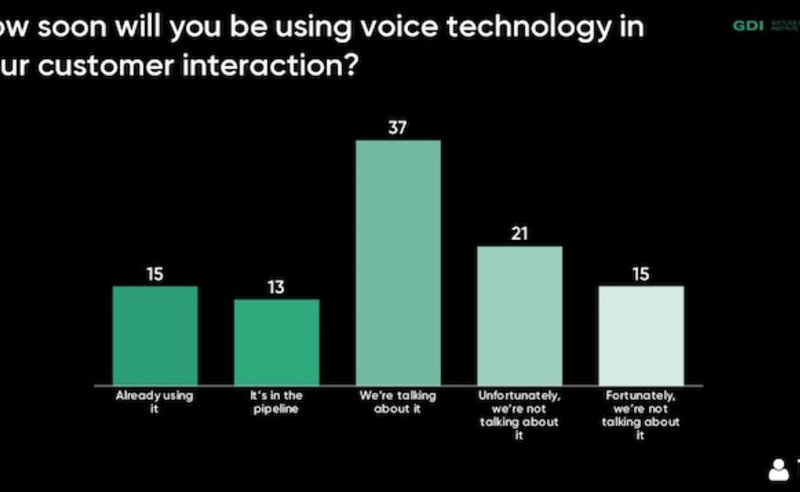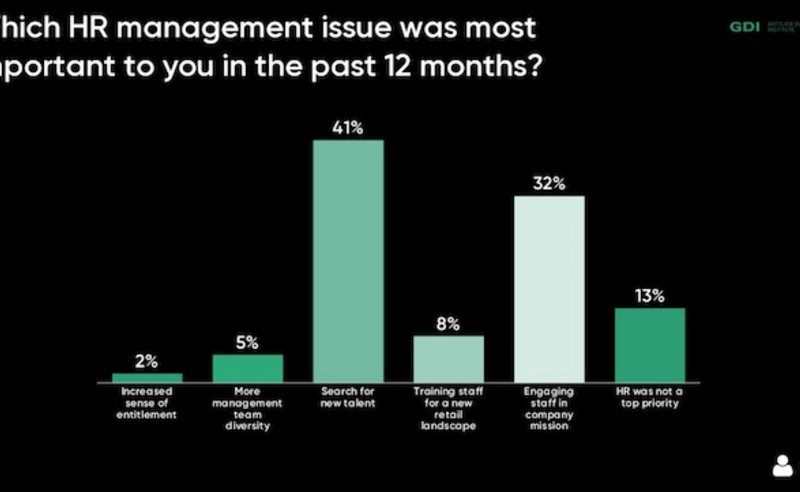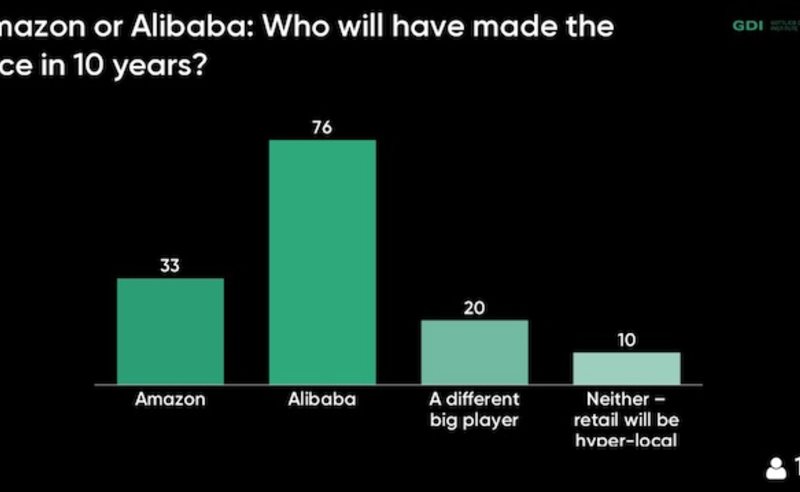David Bosshart, CEO, GDI Gottlieb Duttweiler Institute: "We have to talk about transformation, not change, because it affects everything."
The complexity of everyday life has increased and we are only at the beginning of exponentiality. We have to talk about transformation, not change, because it affects everything. The question is: How can we use data to create value in retail? Up to now, many interfaces have been protected, but the key is: more data, less privacy, more innovative insights. Customer's attention must be attracted by "sustainable attention hacking", a new entertainment economy is emerging.
Traditional, stationary retail has opportunities if you do it well, like Walmart did. Subscription models and housing-on-demand are other exciting topics, even Aldi is now building apartments. The peak of ownership has been reached, the baby boomers want to get rid of their "stuff". Convenience is often boring, but never trivial.
Terry Young, Founder, sparks & honey: "Data is a double edged sword, creating opportunities or sinking brands."
Market fragmentation forces brands to rethink their products. Data is a double-edged sword: it opens up new opportunities, but can also destroy brands. The fact that online commerce is available always and everywhere transforms retail spaces into experience spaces. 60 cents of each dollar generated in retail is influenced by online interactions. Trends that will change commerce the most: 1. expert automation (employees will work 100% augmented); 2. ecosystems before companies (big brands lose shares to start-ups and small brands, connections become more complex, WeChat is bank, ID, community, marketplace all in one); 3. reality manipulation (everything can be hacked, so the supply chain must be transparent); 4. data as a human right (blockchain as a way to protect data); 5. ten times more personal (which tools help to make the customer experience more personal?); 6. unclear responsibility (trust will be the biggest differentiator).
Richard Kelly, Chief Catalyst, Fung Academy, Fung Group: "If you don't have a presence in Asia now, and want to become a world leader, you are probably too late."
Organisations are very bad at creating new opportunities. Those who do not yet have a presence in Asia, but want to become world market leaders, are probably too late. It's no longer about content, it's about context. In China, everything goes much faster. The question is: how can we learn and unlearn faster? Open communities are much more advantageous for learning than secure company knowledge. We need the willingness to try. Privacy vs. convenience: China has long since decided in favour of convenience. Values beyond money are becoming more important. Get out, go as far as you can and feel uncomfortable.
Fabrice Zumbrunnen, President of the Executive Board, Federation of Migros Cooperatives: "The ecosystem with whom we work will become more important."
It's not a revolution, it's a better version of Migros. It should become more agile. The complex structures of the cooperative can also be advantageous when it comes to tackling the last mile to the customer, Migros is at the forefront. The value chain and its expansion will still be a major topic. The question of who Migros is working with will also gain in importance. Migros must be open and willing to cooperate, but cooperation must lead to a win-win situation for both sides. There are great opportunities for growth in the convenience segment, but also in the food segment. Customer surveys show: Proximity and quality are valued.
Michael Mueller, CEO, Valora Group: "Convenience will have a new competitor called Delivery."
Valora kiosks are experiencing a decline of magazine and tobacco sales. The press business has halved over the past ten years. With its new Avec stores, Valora is introducing a new "food convenience" experience. The convenience market is experiencing a boom linked to megatrends in consumption. Consumers are more mobile, eat on the move and often live alone. Alibaba is not yet helping with on-the-go demand. And: the convenience sector is an exciting partner for the consumer goods industry because it has access to consumers. Convenience will have a new competitor: delivery. The concept development cycles will be much shorter, but will contradict long-term leases. The focus must shift from business administration to innovation. If Valora makes plans that are too small, the company will be overwhelmed.
Stephan Zoll, CEO, Signa Sports Group: "Differentiation is key to drive barriers for entry."
The sporting goods market is very attractive compared to fashion or furniture: high average order value, low return rates, low fashion risk, wide range of special products, high return rates. The top five sporting goods suppliers in Europe share 18% of the market. Differentiation is the key to entering the sporting goods market.
Behshad Behzadi, Distinguished Engineer, Site Lead Google Switzerland: "Talking to machines is nice, but in 20 years we will talk to our environment."
The AI revolution is happening now. Talking to machines is nice, but in 20 years we will talk to our environment. There are 20,000 different ways to ask about the weather, Google Assistant understands them all. People use context all the time when they talk to each other. Google researchers teach this context to the Assistant. Google is creating the future.
Audience survey:

Jarno Vanathapio, Founder and CEO, NA-KD: "For millennials, the glossy thing doesn't work anymore."
Na-kd is not only a brand, but also an "enabler". The brand enters into many collaborations. Online-fashion will be the winner. Na-kd tries to get the eight seconds of attention of Generation Z. "Glossy" no longer works for millennials. Generation Z is post-materialistic, sustainable (but not yet ready to pay for it), expressive. The mass market is over, today you no longer sell the same dress to millions of customers.
Jan Sedlacek, Co-founder and Managing Partner, Stryber: "It's not about a digital strategy, it's about being digital."
With 20% of the market online, the market is starting to collapse. It's not about a digital strategy, it's about being digital. Wild "open innovation" doesn't help much. Lesson from the Kuoni demise: a clear vision is the basis for everything.
Marije Vogelzang, Eating designer and founder, Dutch Institute for Food & Design: "A big mess at the end is always a sign of good design."
Do we really need more newly designed products? The food culture is much more interesting and changes every day. A big chaos at the end is always the sign of good design. In restaurants in addition to the wine menu there should be a menu with water from the region. The vegi isle in the supermarkets today is a mere copy of the meat isle with vegi sausages and burgers. But as a vegetarian you should feel that you are doing something good.
Pierluigi Collina, Legendary Football Referee: "It is not enough to know the rules of the game. You have to anticipate what is going to happen."
Referees have to withstand enormous pressure when refereeing a game. Pressure from up to 90,000 spectators, but also pressure from the importance of the game, from the money behind it. Referee decisions can be worth 200 million pounds. A wrong decision can mean the end of a referee's career. In the future, players will become more agile, more money will be at stake, and more technology will support the referee in his decisions. Even more important than knowledge is interpretation. The referee must always foresee the next step in the game. He can do this by analyzing the behavior of players and teams before the match. Big data analyses already help here today. Machine learning can be the future of refereeing.
Lucy Harris, Partner, Clarity Search: "Bring in talent who thrive in ambiguity."
70% of employee transformation happens in digital start-ups. 45% in department stores. Uncertainty provides a platform for transformation and opportunity. Consumer-driven companies need to develop just as much as their executives. The trend is towards small, tightly staffed teams. The goal should be to create "frictionless" companies, not just flawless customer experiences. The best companies behave intuitively towards their customers. Good results and growth then come all by themselves. Bring in talent who thrive in ambiguity. Mindset can matter more than functionality. Learn rapidly, too much thinking can be inefficient. Agility and change are oil for the wheels of change in retail.
Audience survey:

Christoph Werner, Managing Director Marketing & Procurement, dm-Drogerie-Markt: "Free people want to be able to connect with ideas."
We need a new expression of the lasting business idea. This is certainly easier to grasp in start-ups than in established companies. It is challenging to transform sophisticated business processes. Today we face the phenomenon of empowerment: thanks to the Internet, individuals have a tremendous amount of information at their disposal. Hypes of certain products we didn't know before in this order of magnitude. This also requires a rethink if these products remain on the shelves after a short period of time. In the past, only the church or the military had the size of Amazon. In such huge companies the goals are low process costs and sophisticated business processes, but employees become innovation-resistant in this way. There are four success concepts for the age of empowerment: 1. learn how to deal with increasing complexity: empowering employees. 2. turn the organizational pyramid upside down: the task of managers is to ask the right questions. 3. work with perspectives instead of dogmas. 4. necessity of sense centering: is it about the customers, or you? Free, empowered people want to connect with ideas. dm no longer acts according to the master principle, but according to the evocator principle.
Sandrine Retailleau, President and Co-Founder, La Salle de Sport with Reebok: "Inspire, engage, convert.”
"La Salle de Sport with Reebok" in Paris offers four sports rooms for different sports: boxing, indoor cycling, yoga and cross-fit. It is the largest Reebok store in Europe. There you can test outfits directly during the workout. The aim is to create emotional connections between the products and the people. The shop should be a place where people feel at home. It is important to create a reason why customers should come back to the shop, spend time there and buy products.
Reiner Pichler, Group CEO, Calida Holding: "For us, e-commerce is much more than a sales channel; it is our focus.”
E-commerce accounts for 10% of Calida's total sales and is firmly anchored in the corporate culture. Shopping is available online around the clock, but done always under time pressure. Customers are becoming more demanding. There are hardly any regular customers left. They may still be loyal to the brand, but not to the channel. The proportion of total income spent on clothing in Germany fell to half between 1992 and 2016. Innovations are supposed to trigger impulses and motivate customers to go into shops. The point is to be authentic and genuine, not to win marketing prizes.
Sir Ian Cheshire, Chairman, Debenhams: «Change is possible on a faster rate than ever before.»
Over the next five years we will see more change than ever before. The situation for retailers will worsen. Retail is very conservative and struggling with innovation. Now we see a comprehensive transformation. If retailers don’t see the level of change, they will be the first victim. Consumers, technology and business models are driving this change. Consumers want to shop across channels and immediately. They are looking for something new, authentic and products with which they can differentiate themselves. Consumers turn away from stuff and towards experiences. A high degree of disruption is coming to retail. Increasingly, vertical, specialized platforms will celebrate success. Retailers who are not sure what their business model is will lose. Set up a dissatisfaction with what you do today in order to enable change.
Audience Survey:
